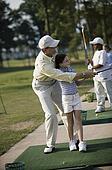- providing emotional support and positive feedback,
- attending some games and talking about them afterward,
- having realistic expectations for your child,
- learning about the sport and supporting your child's involvement,
- helping your child talk with you about their experiences with the coach and other team members,
- helping your child handle disappointments and losing, and
- modeling respectful spectator behavior

Although this involvement takes time and creates challenges for work schedules, it allows you to become more knowledgeable about the coaching, team values, behaviors, and attitudes. Your child's behavior and attitude reflects a combination of the coaching and your discussions about good sportsmanship and fair play.
It is also important to talk about what your child observes in sports events. When bad sportsmanship occurs, discuss other ways the situation could be handled. While you might acknowledge that in the heat of competition it may be difficult to maintain control and respect for others, it is important to stress that disrespectful behavior is not acceptable. Remember, success is not the same thing as winning and failure is not the same thing as losing.
If you are concerned about the behavior or attitude of your child's coach, you may want to talk with the coach privately. As adults, you can talk together about what is most important for the child to learn. While you may not change a particular attitude or behavior of a coach, you can make it clear how you would like your child to be approached. If you find that the coach is not responsive, discuss the problem with the parents responsible for the school or league activities. If the problem continues, you may decide to withdraw your child.
 As with most aspects of parenting, being actively involved and talking with your children about their life is very important. Being proud of accomplishments, sharing in wins and defeats, and talking to them about what has happened helps them develop skills and capacities for success in life. The lessons learned during
As with most aspects of parenting, being actively involved and talking with your children about their life is very important. Being proud of accomplishments, sharing in wins and defeats, and talking to them about what has happened helps them develop skills and capacities for success in life. The lessons learned during children's sports will shape values and behaviors for adult life.





No hay comentarios:
Publicar un comentario